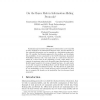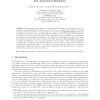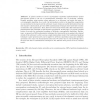978 search results - page 33 / 196 » Knowledge, Probability, and Adversaries |
135
click to vote
JCS
2008
15 years 1 months ago
2008
Randomized protocols for hiding private information can be regarded as noisy channels in the information-theoretic sense, and the inference of the concealed information can be reg...
162
click to vote
ICNP
2009
IEEE
14 years 11 months ago
2009
IEEE
Sensor networks deployed in hostile areas are subject to node replication attacks, in which an adversary compromises a few sensors, extracts the security keys, and clones them in a...
121
Voted
ISW
2007
Springer
15 years 8 months ago
2007
Springer
Abstract. We study the provable security of identity-based (ID-based) key agreement protocols. Although several published protocols have been proven secure in the random oracle mod...
122
click to vote
SACRYPT
2004
Springer
15 years 7 months ago
2004
Springer
A general method to secure cryptographic algorithm implementations against side-channel attacks is the use of randomization techniques and, in particular, masking. Roughly speaking...
AAAI
2000
15 years 3 months ago
2000
A common challenge for agents in multiagent systems is trying to predict what other agents are going to do in the future. Such knowledge can help an agent determine which of its c...



